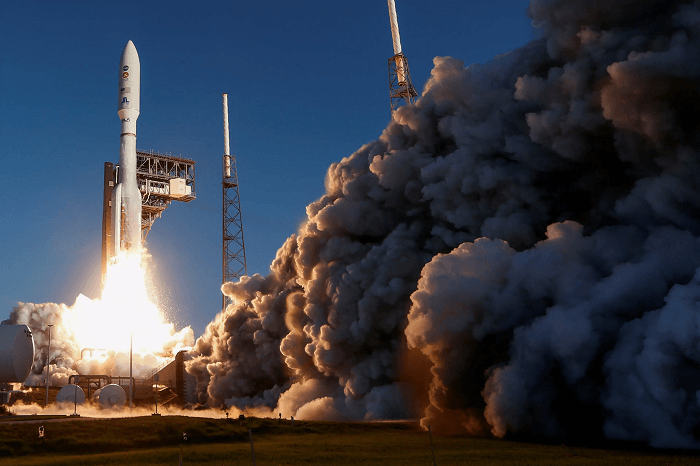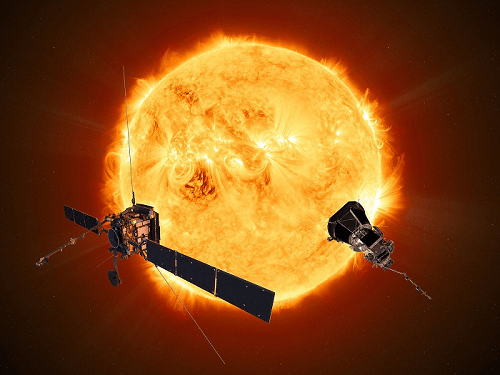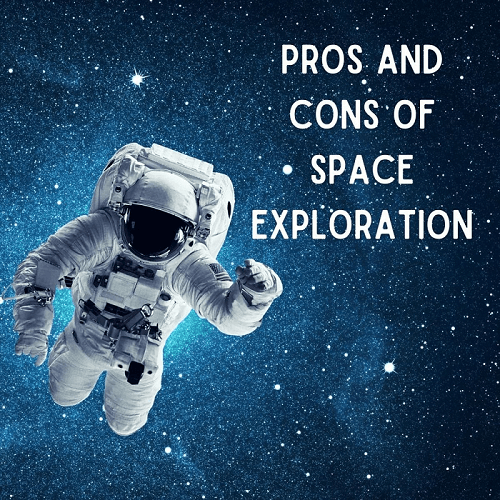Advantages and Disadvantages of Space ExplorationSpace exploration is the ongoing discovery and study of celestial bodies in deep space using rapidly increasing space technologies. While astronomers generally employ telescopes for space studies, genuine space exploration involves human-crewed and uncrewed robotic missions. 
Even while astronomy?the study of celestial objects?has been around since the earliest reliable written records, it was not until the early 20th century that space travel became a reality. The advancement of knowledge, the unification of diverse nations, the guarantee of human life, and the acquisition of military and geopolitical advantages over other states are common arguments for space exploration. 
The Cold War and other geopolitical rivalries have occasionally been represented by space competition. Most often considered turning points in the history of space travel are the Soviet Union's Sputnik 1 launch on October 4, 1957, and the American Apollo 11 craft's first Moon landing on July 20, 1969. A "Space Race" between the United States and the Soviet Union helped to launch the early space exploration period. In 1957, the first living organism was placed into orbit by the Soviet space program, which also launched the first space station (Salyut 1). The first spacewalk was finished on March 18, 1965, the first autonomous landing on another celestial body was accomplished in 1966, and the first space station (Salyut 1) was launched in 1961. It also carried Yuri Gagarin on board Vostok 1 for the first human spaceflight in 1961. After the first 20 years of exploration, the emphasis shifted from one-off trips to durable gear, like the Space Shuttle program, and from rivalry to collaboration, like with the International Space Station (ISS). Since STS-133's main completion of the ISS in March 2011, plans for American space exploration are still in flux. The Bush Administration's Constellation program, which sought to send a crew back to the Moon by 2020, was found underfunded and impossible in 2009 by an expert assessment team. In 2010, the Obama Administration proposed a Constellation redesign to establish the capability for crewed trips outside of low earth orbit (LEO). They envisaged extending the ISS's operational life past 2020, delegating to the private sector the creation of crewed launch vehicles and creating technology to enable missions beyond low-Earth orbit (LEO), such as trips to the Moon, Earth/Moon L1, the Sun, nearby asteroids, Phobos, or Mars orbit. Constellation is likely to be terminated, and funding for building a heavy lift launch vehicle will be provided as part of the compromise NASA spending bill that the US Senate and House of Representatives are still debating as of March 2011. (HLLV). The European Union, Japan, and India have all planned human-crewed space missions in the future. The People's Republic of China launched a successfully operated spaceflight program in the 2000s. China, Russia, Japan, India, the European Union, and other nations have backed human-crewed expeditions to the Moon in the twenty-first century, along with human-crewed missions to Mars. 
Advantages of Space ExplorationLet us consider the advantages of space exploration for Earth. 1. Advanced Robotics and AI Everything in space and outside of Earth's atmosphere is hostile. Our means of exploration are robots and artificial intelligence. The brightest minds are constantly working to create the technology to let us travel to Mars and beyond. The same technologies are employed on the third planet, assisting search and rescue operations and facilitating disabled people's mobility. 2. Safer Food Space ice cream does not have the same texture as regular ice cream. Thus the task of providing astronauts with safe, contaminant-free food necessitated some very unusual solutions. The FDA now uses the Hazard Analysis and Critical Control Point methodology established by Pillsbury for NASA to assure the safety of foods purchased from stores. This methodology was created to eradicate microorganism contamination within spacecraft. 3. Cleaner Water One of the most important gifts that planet Earth has received from space research is liquid. NASA created a basic, portable water filtration system due to the requirement to filter water for astronauts adequately. Because of this, low-cost, simple-to-use water filtration devices were created and are currently used worldwide to supply clean drinking water or produce crops on otherwise sterile land. 4. Asteroid Aversion Ask any prehistoric animal; Earth-bound asteroids are nothing to laugh at. In actuality, a meteor greater than 100 meters in diameter striking Earth would result in a catastrophic catastrophe. It may be possible to prevent humans from sharing the same destiny as our mammoth ancestors through careful space presence and the existing technology of spacecraft-driven nuclear explosions. 5. Medical Innovation Astronauts have had access to the International Space Station, where they have been able to test and refine medical advancements that have revolutionized healthcare on Earth. The future of modern medicine is happening in tandem with space exploration, from delicate robotic surgery performed inside an MRI machine to life-saving cancer treatments. 6. Sourcing of Critical Raw Materials We already know that meteorites come to Earth with unusual, frequently unheard-of metals and elements or scatter gold dust in their wake. However, the Moon is a close neighbor where one can find other rare earth elements. For instance, helium-3 is a possible fuel for nuclear power reactors and is employed in some specialized MRI procedures. Other elements are utilized in modern electronics and solar panels, similar to tantalum and europium. 7. Combating Climate Change The elimination of carbon dioxide from the air in space stations and planetary outposts is one of the major difficulties of space travel. We are learning more about how to lessen the presence of the same harmful substance in our surroundings as powerful brains struggle to clean the air within spaceships. In addition, the satellites that orbit our planet can deliver precise information that aids in our understanding and control of climate change. 8. World Peace The International Space Station welcomed personnel and spacecraft from eighteen nations during its orbit. Developing deeper diplomatic ties and more trust between otherwise distant nations may be the key to international collaboration. The situation in Ukraine has just lately put a strain on this global alliance, but so far, those bonds have only bowed, not broken, and there are reasons to be optimistic that the global partnership will persist and inspire. 9. Nurturing Human Curiosity Since we are inherently inquisitive organisms, humans stand out from other life forms on Earth because of our need to learn and explore. Space travel provides a clear picture of how insignificant we are in the grand scheme of things and a peek at mysterious magic. Our human curiosity is sated and fueled by the discovery of a new galaxy and the detection of a black hole, which keeps us thinking if there is extraterrestrial life in the universe. 10. Inspiring Future Generations Children worldwide witnessed the impossibility of their impossible dream come true when the youngest person to fly into space ever joined a SpaceX mission. No longer a fantasy or a privilege reserved for a select few, space flight is a reality. Children can now envision the potential of going to space for the first time in human history, promoting science education and occupations that will increase the world's capacity for astounding innovation. Disadvantages of Space Exploration1. Our Current Technology Makes It Dangerous To Get Into Space In The First Place. However, this is not an exploratory activity. Several organizations are creating "space tourism" packages that can transport passengers in comfortable aircraft to the very outer reaches of our atmosphere. In order to have enough speed to escape the pull of gravity, we now strap people into a spacecraft connected to a massive rocket. Since Theodore Freeman, who perished in the crash of a T-38 in October 1964, more than 20 people have perished in the line of duty while promoting the goals of the American space program. Only two people (Gus Grissom and Peter Siebold) have been able to withstand an issue that led to the loss of a spacecraft. 2. There Are Cost Considerations To Look At With Space Exploration. One of the main criticisms of the efforts to begin a program that takes us beyond our planet is the cost of space exploration. The overall cost of the launch when the American space shuttle program was in operation was close to $500 million. This sum does not account for the costs of postponement, which frequently occurred when it was not feasible to launch a rocket into orbit. In our solar system, human-crewed missions cost ten times as much, but they could take us to Mars or one of Jupiter's moons. Technology developments in recent years might make this problem more affordable for the younger generation. However, we should consider whether spending billions on space exploration is the proper action when people on Earth are starving to death. 3. Astronauts Receive Exposure To Natural Dangers While In Space. During a manned space exploration attempt, the natural threats outside our planet's atmosphere might become troublesome in several ways if the launch process does not kill you. While in space, astronauts are always at risk from the sun's radiation, and the absence of gravity might affect their physical state. Experiments with identical twins in which one remained on Earth and the other spent an extended period in space demonstrate that space flight also results in alterations at the cellular and genetic levels. 4. Current Space Exploration Efforts Could Be A One-Way Trip. The astronauts' flight to Mars may be a one-way trip if we decide to begin investigating it. Our technology allowed the astronauts to land on the Moon's surface and return to their spacecraft when we placed them there. We might take a similar course of action for asteroids, moons orbiting other planets, and other celestial worlds devoid of an atmosphere. Even if this trip is not a one-way excursion, the amount of time needed to go to a location beyond the Moon renders mounting a rescue effort nearly difficult if something needs to be fixed. For our current conception of space exploration to succeed, perfection is necessary. 5. There May Not Be a Reason To Start Exploring Now. Exploring space has always been a source of fascination for human societies because it satisfies our desire to know more about the cosmos. The Hubble telescope's long-distance images differ from going to the place in person. The question that needs to be answered is whether there is a good reason to start this project. In reality, there are few practical applications to take into account. In the future, we might start extracting minerals and raw materials from asteroids. Future generations may need to colonize other planets. Addressing our present concerns may be preferable to focus on future requirements that may or may not be required, given that we are still dealing with problems like poverty and crime here at home. 6. Unmanned Probes Could Be a Better Use Of Resources. Sending autonomous probes into the ominous void that lies beyond is one of the ways we try to cut costs with our space travel requirements. These endeavors have had some success, most notably the Voyager 1 and 2 missions that allowed humanity to look outside our solar system. With this choice, we can also almost eliminate any risk to human life. The need for more flexibility with this strategy in response to shifting conditions is just one of the drawbacks. A prime illustration of this issue is the Mars Climate Orbiter. At the cost of more than $120 million, it burned up as it entered the atmosphere after receiving the wrong landing coordinates and before providing any data. 7. Our Current Information Needs to Be Updated. Seven Earth-sized planets were discovered in a single solar system, according to a February 22, 2017, NASA report. Three of the planets were in the "Goldilocks Zone," a location between hot and cool about their star where it is just right. This collection of planets, known as the Trappist-1 group, is located in the Aquarius system. It is at least a quantifiable distance since it is around 235 trillion miles distant. This planet system's distance from us of 40 light-years is an issue. That indicates that it took our scientists forty years to receive the information we can currently observe. Consider all the changes in your life in the last five years alone, and then extrapolate that idea to the entire world. In order to avoid flying into an unexpectedly perilous situation when we begin exploring space, we must consider the fact that this delay is present. 8. It May Lead Us into Future Conflict With Beings Who Have Superior Technology. We consider the universe's potential for humanity nobly as a result of space exploration. We left two records aboard the Voyager spacecraft when we sent it beyond our solar system to communicate with any intelligent species that might come across them and let them know that we are a civilization. According to most thinkers who properly weigh the benefits and drawbacks of encountering alien life, only two possibilities can occur with the first contact. It will either be a hostile race that wants to take advantage of our planet's resources or a technologically advanced species that has created a peaceful civilization in which information sharing may be possible. ConclusionIn conclusion, space travel is bad because radiation and accidents can be dangerous to astronauts and potentially endanger their lives. However, there are a handful of benefits that stand out. These include money spent on space research will spur economic expansion by bringing new job opportunities and technological advancements. Because the scarcity of valuable and usable resources will be alleviated by mining and extracting materials in space and converting waste, space exploration is also a vital program. This leads to the conclusion that space exploration funding should be allocated due to the large impact of these benefits.
Next TopicAdvantages and Disadvantages of Speakers
|
 For Videos Join Our Youtube Channel: Join Now
For Videos Join Our Youtube Channel: Join Now
Feedback
- Send your Feedback to [email protected]
Help Others, Please Share









